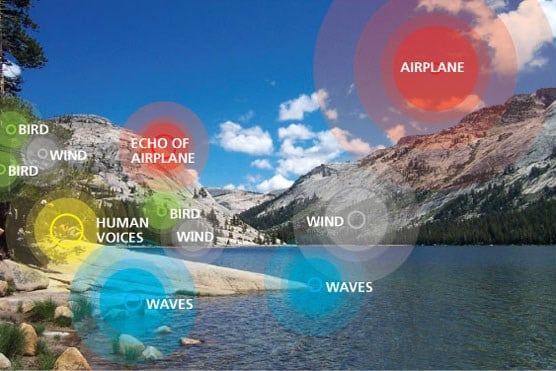Everything in the world is connected. The sounds around us play an integral part in our relationships with people and nature, forming a tapestry studied by an auditory expert known as an acoustic ecologist.
Acoustic ecology is both an entertainment profession and an academic field of study concerned with the relationship between sound and the environment. It is an interdisciplinary field that combines elements of ecology, acoustics, and biology to understand the natural soundscape and how it is affected by human activity. An acoustic ecologist is a professional who specializes in studying the acoustic environment and the effects of noise pollution on ecosystems.

Beginnings In The Science of Sound
R. Murray Schafer, a Canadian composer and music educator, first coined the term acoustic ecology in the late 1960s. Schafer was interested in the relationship between sound and the environment. He believed that the soundscape was an essential part of our natural environment and that noise pollution was detrimental to our health and well-being.
Sound Studies
Acoustic ecology, a field that is still evolving, encompasses a wide range of areas of study. These include:
- Soundscape ecology: Acoustic researchers study the planet’s natural soundscape, including the sounds produced by animals and the natural environment. It seeks to understand the role of sound in ecosystems and how human activity affects these natural soundscapes.
- Noise pollution: Acoustic ecologists are concerned with the effects of noise pollution on humans and wildlife. Noise pollution can have a range of negative effects, including hearing loss, stress, and disrupted communication among animals.
- Bio-acoustics: This type of ecological study is closely related to soundscape research as it primarily studies sounds produced by animals, including their vocalizations and other sounds. It can provide important information about animal behavior and can be used to monitor populations and study their communication.
Soundscape Design
Acoustic ecologists play a crucial role in designing urban soundscapes. For instance, they may advise on the placement of buildings, transportation systems, and other infrastructure to create soundscapes that are pleasant to all who live there. Acoustic ecologists can work in various settings, including universities, research institutions, and government agencies. They may also work as consultants, helping to design soundscapes for urban areas or advising on the placement of wind turbines and other infrastructure to minimize noise pollution.
One of the key challenges facing acoustic ecologists is the increasing level of noise pollution in many parts of the world. Noise pollution has a range of adverse effects on human health, including:
- hearing loss
- sleep disturbance
- cardiovascular disease
Sound pollutants also negatively impact wildlife, including:
- habitat fragmentation
- changes in behavior
- increased mortality rates.
Acoustic ecologists work to address habitat destruction by studying strategies to mitigate noise pollution. Designing quieter transportation systems, developing noise barriers, and creating green spaces can serve as buffer zones between urban areas and natural habitats.
Acoustic ecologists also monitor and study the soundscape of natural habitats. Changes in sound patterns provide important information about ecosystem health and the impact of human activity.
For example, the sounds produced by certain animals may provide information about their behavior and the state of their populations.
Another area of interest for acoustic ecologists is the study of acoustic communication among animals. Many species of animals rely on sound to communicate with each other, and changes in the acoustic environment can significantly impact their ability to communicate. Acoustic ecologists study these communication patterns to better understand the behavior and ecology of these species.
